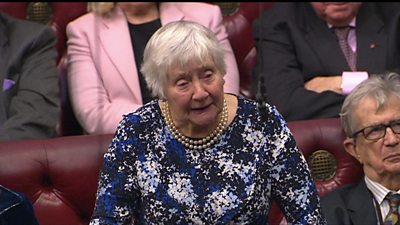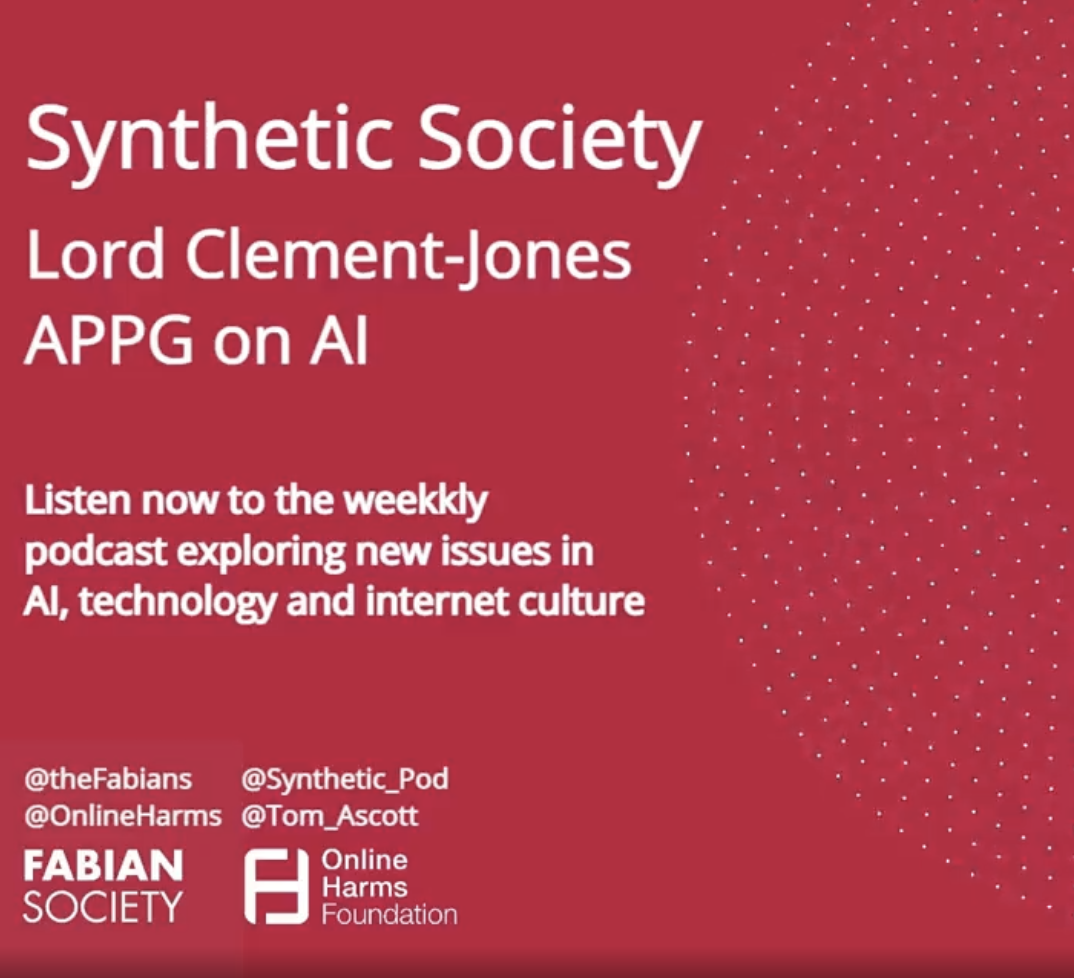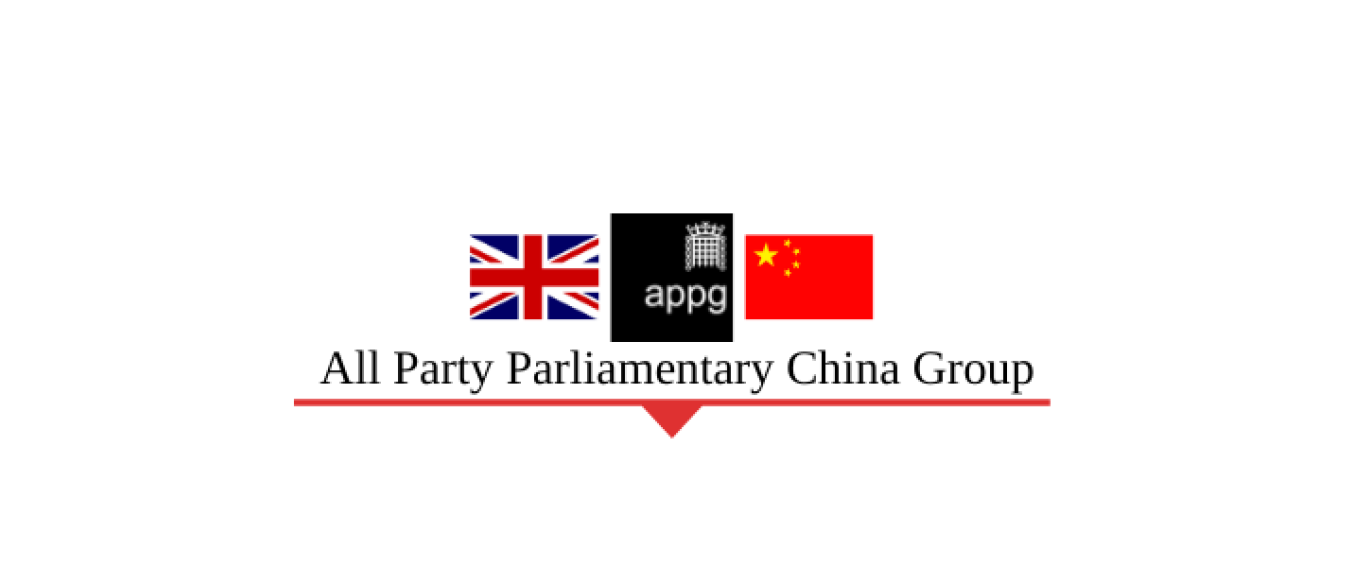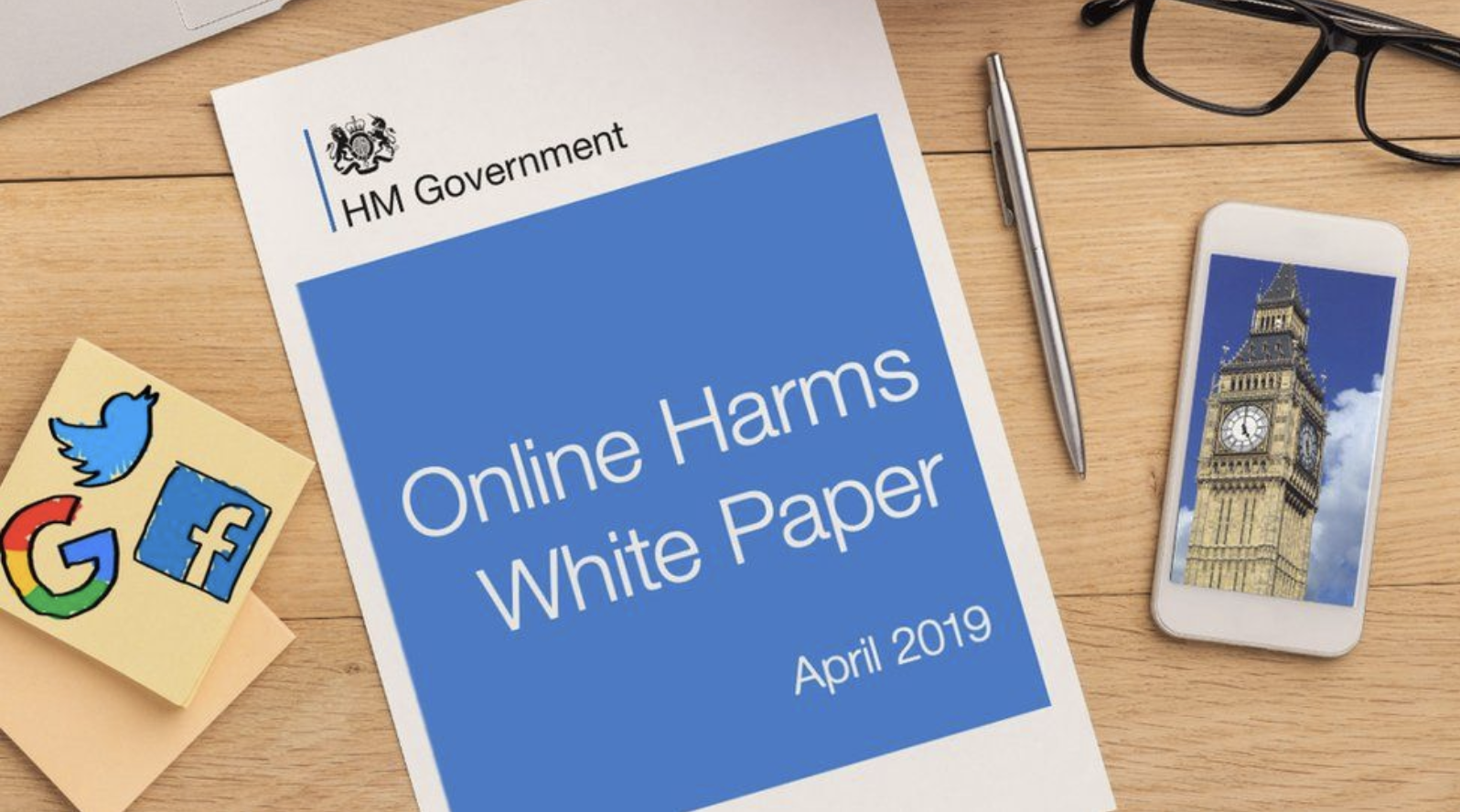Lord C-J: Government must resolve AI ethical issues in the Integrated Review
The opportunities and risks involved with the development of AI and other digital technologies and use of data loom large in the 4 key areas of the Strategic Framework of the Integrated Review.
The House Live April 2021
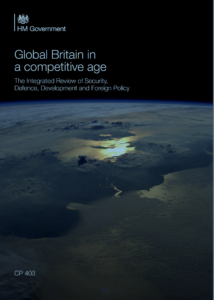
The Lords recently debated the government’s Integrated Review set out in “Global Britain in a Competitive Age”. The opportunities and risks involved with the development of AI and other digital technologies and use of data loom large in the 4 key areas of the Strategic Framework of the Review. So, I hope that the promised AI Strategy this autumn and a Defence AI Strategy this May will flesh these out, resolve some of the contradictions and tackle a number of key issues. Let me mark the government’s card in the meantime.
Commercialisation of our R&D in the UK is key but can be a real weakness. The government need to honour their pledge to the Science and Technology Committee to support Catapults to be more effective institutions as a critical part of Innovation strategy. Access to finance is also crucial. The Kalifa Review of UK Fintech recommends the delivery of a digital finance package that creates a new regulatory framework for emerging technology. What is the government’s response to his creative ideas? The pandemic has highlighted the need for public trust in data use.
"The pandemic has highlighted the need for public trust in data use"
Regarding skills, the nature of work will change radically and there will be a need for different jobs and skills. There is a great deal happening on high-end technical specialist skills. Turing Fellowships, Phd’s, conversion courses, An Office for Talent, a Global Talent Visa etc. As the AI Council Roadmap points out, the government needs to take steps to ensure that the general digital skills and digital literacy of the UK are brought up to speed. A specific training scheme should be designed to support people to work alongside AI and automation, and to be able to maximise its potential.
Building national resilience by adopting a whole-of-society approach to risk assessment is welcome but in this context the government should heed the recent Alan Turing Institute report which emphasizes that access to reliable information particularly online is crucial to the ability of a democracy to coordinate effective collective action. New AI applications such as GPT3 the language generation system, can readily spread and amplify disinformation. How will the Online Safety legislation tackle this?
At the heart of building resilience must lie a comprehensive cyber strategy but the threat in the digital world is far wider than cyber. Hazards and threats can become more likely because of the development of technologies like AI and the transformations it will bring and how technologies interconnect to amplify them.
A core of our resilience is of course defence capability. A new Defence Centre for Artificial Intelligence is now being formed to accelerate adoption and a Defence AI strategy is promised next month. Its importance is reinforced in the Defence Command Paper, but there is a wholly inadequate approach to the control of lethal autonomous weapon systems or LAWS. Whilst there is a NATO definition of “automated” and “autonomous”, the MOD has no operative definition of or LAWS. Given that the most problematic aspect – autonomy – has been defined is an extraordinary state of affairs given that the UK is a founding member of the AI Partnership for Defence, created to “provide values-based global leadership in defence for policies and approaches in adopting AI.”
The Review talks of supporting the effective and ethical adoption of AI and data technologies and identifying international opportunities to collaborate on AI R&D ethics and regulation. At the same time, it talks of the limits of global governance with “competition over the development of rules, norms and standards.” How do the two statements square? We have seen the recent publication of the EU’s proposed Legal Framework for the risk-based regulation of AI. Will the government follow suit?
Regarding data, the government says it wants to see a continuing focus on interoperability and to champion the international flow of data and is setting up a new Central Digital and Data Office. But the pandemic has highlighted the need for public trust in data use. Will the National Data Strategy (NDS) recognize this and take on board the AI Council’s recommendations to build public trust for use of public data, through competition in data access, and responsible and trustworthy data governance frameworks?
Lord Clement-Jones is a Liberal Democrat member of the House of Lords, former Chair of the Lords Select Committee on AI and co-chair the APPG on AI.
Shirley Williams 1930-2021
So sad to lose Shirley Williams, such a warm, principled and inspiring political pioneer. The conscience of the Liberal Democrats

The Digital Regulation Cooperation Forum: Priorities for UK Digital Regulation

https://www.aldes.org.uk/the-drcf-priorities-for-uk-digital-regulation/
Last July the Competition and Markets Authority (CMA), the Information Commissioner’s Office (ICO) and the Office of Communications (Ofcom) formed the Digital Regulation Cooperation Forum (DRCF) which last month outlined its priorities in a Workplan for 2021/22.
The creation of the DRCF is a significant move by these regulators in the coordination of regulation across digital and online services and, as they say, recognises the unique challenges posed by regulation of online platforms which are playing an increasingly important role in our lives.
The Workplan for 2021/22 is designed to set out what they fashionably call a roadmap for how Ofcom, the CMA, ICO and, from this month as a full member of the DRCF, the FCA, will increase the scope and scale of this coordination through “pooling expertise and resources, working more closely together on online regulatory matters of mutual importance, and reporting on results annually.”
In launching the Workplan, the DRCF invited comments and observations on its content. The challenge has been taken up by a number of Liberal Democrat colleagues in the Lords, coordinated by myself as Digital Spokesperson.
We wholly welcome the creation of the DRCF and the creation of a cross regulator Workplan. Cross collaboration between regulators is of great importance as technological, digital and online issues faced by regulators increasingly converge, especially in the light of the growing emergence of digital issues across the regulatory field, such as data use and access, consumer impact of algorithms and the advent of online harms legislation.
We suggested a number of additions to supplement what is essentially an excellent core plan with some other areas of activity which should be undertaken as part of the plan, resources permitting.
The context of the regulators’ work is provided by the overall aim of the Government to ensure “an inclusive, competitive and innovative digital economy” . To this we want to see the addition of the words “ethical, safe and trustworthy”.This is not only crucial in terms of public trust but very much in line with one of the announced three key pillars of the Government’s AI Strategy to be published later this year by the Government and other aspects of the government’s National Data Strategy.
The key areas of activity set out in the Workplan are:
- Responding strategically to industry and technological development;
- Developing joined up regulatory approaches;
- Building shared skills and capabilities
- Building clarity through collective engagement
- Developing the DRCF
Responding Strategically to industry and technological developments
A number of emerging trends and technological developments are referred to in the plan. These include broad areas such as design frameworks, algorithmic processing (and we must assume this includes algorithmic decision making), digital advertising technologies and end-to-end encryption.
There are significant implication from other emerging issues however which we also think require particular attention from the regulators such as Deepfakes, Live Facial Recognition, collection use and processing of behavioral data beyond advertising and devices (such as smart meters) which collect and share data and are part of the Internet of Things.
Developing joined up regulatory approaches
Here the Workplan suggests concentrating on Data Protection and Competition Regulation, the Age Appropriate Design Code (aka Children’s Code) introduced by the Data Protection Act, the regulation of video-sharing platforms and online safety and interactions in the wider digital regulation landscape.
We believe however, especially in the light of considerable debate about what are appropriate remedies for market dominance in the context of the digital economy and the growing power of Big Tech, that there should be cross regulator consideration of how proportionate but timely interim and ex ante intervention and structural versus behavioral remedies have application.
Given the importance of simultaneously encouraging innovation and trustworthy use and application of data and AI, we also thought there should be a focus on generic sandboxing approaches to innovative regulated services.
Building shared skills and capabilities
To some extent the Workplan in this area proposes a journey of exploration. It suggests building shared skills through, for instance, secondment programmes, collocated teams, building a shared centre of excellence and co-recruitment initiatives, but without specifying what those shared skills might be.
Last December, I chaired a House of Lords follow up enquiry to the AI Select Committee’s Report AI in the UK : Ready Willing and Able? and our report: AI in the UK: No Time for Complacency concluded and recommended as follows:
“60. The challenges posed by the development and deployment of AI cannot currently be tackled by cross-cutting regulation. The understanding by users and policymakers needs to be developed through a better understanding of risk and how it can be assessed and mitigated…..
61. The ICO must develop a training course for use by regulators to ensure that their staff have a grounding in the ethical and appropriate use of public data and AI systems, and its opportunities and risks. It will be essential for sector specific regulators to be in a position to evaluate those risks, to assess ethical compliance, and to advise their sectors accordingly….”
In addition to these proposals on upskilling on risk assessment and mitigation and the ethical and appropriate use of public data, we have now suggested that, as part of the Workplan, a wider set of skills could be built across the regulators, particularly in the AI space, such as assessments of use of behavioral data in advertising and of ethical compliance of AI systems, Algorithm inspection, AI audit and monitoring and evaluation of Digital ID and Age Verification solutions.
As regards technical expertise available to the DRCF we took the view that it is important that the Alan Turing Institute, the Centre for Data Ethics and Innovation and the Intellectual Property Office are closely involved with the work programme and the DRCF makes full use of their skills and knowledge.
Given the depth and technical nature of many of the skills required, the proposal for a centre of excellence to provide common expertise in digital and technological issues which could draw upon and be of service to all relevant regulators, is vital and should be a resource priority.
As regards the last two priority activities Building Clarity Through Collective Engagement and DRCF development we are strong supporters of the intention to draw upon international expertise. The EU, the Council of Europe and the OECD are all building valuable expertise in AI risk assessment by reference to ethical principles and human rights.
We also welcomed the regulators’ intention to update and review the current MOU’s between the regulators to ensure greater transparency and cooperation.
Other, non-statutory regulators,however, have a strong interest in the objectives and outcomes of the DRCF too. There is welcome reference in the Workplan to the Advertising Standards Authority involvement with the DRCF but as regards other relevant regulators such as the Press Representation Council and BBFC we want to see them included in the work of the DRCF given their involvement in digital platforms.
In addition, there is the question of whether other statutory regulators which have an interest in digital and data issues such as OFWAT or OFGEM with smart meters, or the CAA with drone technology for example will be included in the DRCF discussions and training.
We even think there is a good case for the DRCF to share and spread knowledge and expertise, as it develops, to the wider ADR and ombudsman ecosystem and even to the wider legal system in the light of the new Master of Rolls, Sir Geoffrey Vos’, recent espousal of AI in the justice system.
It may not yet have great public profile but how and the speed at which the work of the DRCF unfolds, matters to us all.
Regulating the Internet
Lord C-J discussion with Tom Ascott of the Online Harms Foundation March 21.

As technology, AI and the internet weave themselves deep into our societies, Synthetic Society is here to help you untangle and understand the mess. Listen to interviews with leading experts, political figures, and entrepreneurs, guiding us through complex issues
This week our guest is Lord Clement-Jones, and we’ll be talking about if technology is becoming more polarised, how the government can lead on regulation for the internet and artificial intelligence, and the relevance of culture and the arts in the digital space.
https://syntheticsociety.libsyn.com/regulating-the-internet
We Need a Legal and Ethical Framework for Lethal Autonomous Weapons

As part of a recent Defence Review, our Prime Minister has said that the UK will invest another £1.5 billion in military research and development designed to master the new technologies of warfare and establish a new Defence Centre for AI. The head of the British Army, recently said that he foresees the army of the future as an integration of “boots and bots”.
The Government however have not yet explained how legal and ethical frameworks and support for personnel engaged in operations will also change as a consequence of the use of new technologies, particularly autonomous weapons, which could be deployed by our armed forces or our allies.
The final report of the US National Security Commission on Artificial Intelligence, published this March however considered the use of autonomous weapons systems and risks associated with AI-enabled warfare and concluded that “The U.S. commitment to IHL” - international humanitarian law - “is long-standing, and AI-enabled and autonomous weapon systems will not change this commitment.”
The UN Secretary General, António Guterres goes further and argues: “Autonomous machines with the power and discretion to select targets and take lives without human involvement are politically unacceptable, morally repugnant and should be prohibited by international law”. Yet we still have no international limitation agreement.
In company with a former Secretary of State for Defence and a former Chief of Defence Staff I recently argued in Parliament for a review of how legal and ethical frameworks need to be updated in response to novel defence technologies. This is my speech in which I pointed out the slow progress being made by the UK Government in addressing these issues.
In a written response subsequent to the debate, the Minister stated that whilst there is a NATO definition of “automated system” and “autonomous system”, the UK Ministry of Defence has no operative definition of Lethal Autonomous Weapon Systems or "LAWS". Given that the most problematic aspect – autonomy - HAS been defined that is an extraordinary state of affairs.
A few years ago, I chaired the House of Lords Select Committee on AI which considered the economic, ethical and social implication of advances in artificial intelligence. In our Report published in April 2018 entitled ‘AI in the UK: Ready, willing and able’ we addressed the issue of military use of AI and stated that 'perhaps the most emotive and high stakes area of AI development today is its use for military purposes’ recommending that this area merited a ‘full inquiry on its own.’ (para 334)
As the Noble Lord Browne of Ladyton has made plain, regrettably, it seems not to have yet attracted such an inquiry or even any serious examination. I am therefore extremely grateful to the Noble Lord for creating the opportunity to follow up on some of the issues we raised in connection with the deployment of AI and some of the challenges we outlined.
It’s also a privilege to be a co-signatory with the Noble and Gallant Lord HAWTON Houghton too who has thought so carefully about issues involving the human interface with military technology.
The broad context of course, as the Noble Lord Browne has said, are the unknowns and uncertainties in policy, legal and regulatory terms that new technology in military use can generate.
His concerns about complications and the personal liabilities to which it exposes deployed forces are widely shared by those who understand the capabilities of new technology. All the more so in a multinational context where other countries may be using technology which either we would not deploy or the use of which could create potential vulnerabilities for our troops.
Looking back to our Report, one of the things that concerned the Committee more than anything else was the grey area surrounding the definition of lethal autonomous weapon systems or LAWS.
As the Noble Lord Browne has said as the Committee: explored the issue, we discovered that the UK’s then definition which included the phrase “An autonomous system is capable of understanding higher-level intent and direction" was clearly out of step with the definitions used by most other governments and imposed a much higher threshold on what might be considered autonomous.
This allowed the government to say “the UK does not possess fully autonomous weapon systems and has no intention of developing them. Such systems are not yet in existence and are not likely to be for many years, if at all”
Our committee concluded that, ”In practice, this lack of semantic clarity could lead the UK towards an ill-considered drift into increasingly autonomous weaponry”.
This was particularly in the light of the fact that at the UN’s Convention on Certain Conventional Weapons Group of Governmental Experts (GGE) in 2017 the UK had opposed the proposed international ban on the development and use of autonomous weapons.
We therefore recommended that the UK’s definition of autonomous weapons should be realigned to be the same, or similar, as that used by the rest of the world.
The Government in their response to the Committee’s Report in June 2018 however replied: The Ministry of Defence “has no plans to change the definition of an autonomous system”.
It did say however: “The UK will continue to actively participate in future GGE meetings, trying to reach agreement at the earliest possible stage.”
Later, thanks to the Liaison Committee we were able - on two occasions last year - to follow up on progress in this area.
On the first occasion, in reply to the Liaison Committee’s letter of last January which asked “What discussions have the Government had with international partners about the definition of an autonomous weapons system, and what representations have they received about the issues presented with their current definition?”
the government replied:
“There is no international agreement on the definition or characteristics of autonomous weapons systems. HMG has received some representations on this subject from Parliamentarians ……” and has discussed it during meetings of the UN Convention on Certain Conventional Weapons (CCW) Group of Governmental Experts (GGE) on Lethal Autonomous Weapons Systems (LAWS), an international forum which brings together expertise from states, industry, academia and civil society.
The GGE is yet to achieve consensus on an internationally accepted definition and there is therefore no common standard against which to align. As such, the UK does not intend to change its definition.”
So no change there my lords until later in the year……. December 2020 when the Prime Minister announced the creation of the Autonomy Development Centre to “accelerate the research, development, testing, integration and deployment of world-leading artificial intelligence and autonomous systems”
In the follow up Report “AI in the UK: No Room for Complacency” published in the same month, we concluded: “We believe that the work of the Autonomy Development Centre will be inhibited by the failure to align the UK’s definition of autonomous weapons with international partners: doing so must be a first priority for the Centre once established.”
The response to this last month was a complete about turn by the Government. They said:
“We agree that the UK must be able to participate in international debates on autonomous weapons, taking an active role as moral and ethical leader on the global stage, and we further agree the importance of ensuring that official definitions do not undermine our arguments or diverge from our allies.
“In recent years the MOD has subscribed to a number of definitions of autonomous systems, principally to distinguish them from unmanned or automated systems, and not specifically as the foundation for an ethical framework. On this aspect, we are aligned with our key allies.
Most recently, the UK accepted NATO’s latest definitions of “autonomous” and “autonomy”, which are now in working use within the Alliance. The Committee should note that these definitions refer to broad categories of autonomous systems, and not specifically to LAWS. To assist the Committee, we have provided a table setting out UK and some international definitions of key terms.”
The NATO definition sets a much less high bar as to what is considered autonomous: “A system that decides and acts to accomplish desired goals within defined parameters, based on acquired knowledge and an evolving situational awareness, following an optimal but potentially unpredictable course of action.”
The Government went on to say: “The MOD is preparing to publish a new Defence AI Strategy and will continue to review definitions as part of ongoing policy development in this area.”
Now, I apologize for taking my Noble Lords at length through this exchange of recommendation and response but if nothing else it does demonstrate the terrier-like quality of Lords Select Committees in getting responses from government.
This latest response is extremely welcome. But in the context of the Lord Brown’s amendment and the issues we have raised we need to ask a number of questions now: What are the consequences of the MOD’s fresh thinking?
What is the Defence AI Strategy designed to achieve. Does it include the kind of enquiry our Select Committee was asking for?
Now that we subscribe to the common NATO definition of LAWS will the Strategy in fact deal specifically with the liability and international and domestic legal and ethical framework issues which are central to this amendment?
If not my Lords, then a review of the type envisaged by this amendment is essential.
The final report of the US National Security Commission on Artificial Intelligence referred to by the Noble Lord Browne has for example taken a comprehensive approach to the issues involved. The Noble Lord has quoted three very important conclusions and asked whether the government agrees in respect of our own autonomous weapons.
There are three further crucial recommendations made by the Commission:
“The United States must work closely with its allies to develop standards of practice regarding how states should responsibly develop, test, and employ AI-enabled and autonomous weapon systems.”
And “The United States should actively pursue the development of technologies and strategies that could enable effective and secure verification of future arms control agreements involving uses of AI technologies.”
And of particular importance in this context “countries must take actions which focus on reducing risks associated with AI enabled and autonomous weapon systems and encourage safety and compliance with IHL (international Humanitarian Law) when discussing their development, deployment, and use”.
Will the Defence AI Strategy or indeed the Integrated Review undertake as wide an enquiry? Would it come to the same or similar conclusions?
My Lords, the MOD it seems has moved some way to getting to grips with the implications of autonomous weapons in the last three years. If it has not yet considered the issues set out in the amendment, it clearly should, as soon as possible, update the legal frameworks for warfare in the light of new technology, or our service personnel will be at considerable legal risk. I hope it will move further in response to today’s short debate.
What will the year of the Ox bring in UK China Relations
Lord C-J: 2020 has brought huge problems to the fore - particularly the COVID19 virus, by no means over and we hope the WHO mission to Wuhan sheds light on how to prevent further viruses from emerging and spreading. Meanwhile repression in Xinjiang and the National Security Law in Hong Kong have damaged confidence in our bilateral relations.
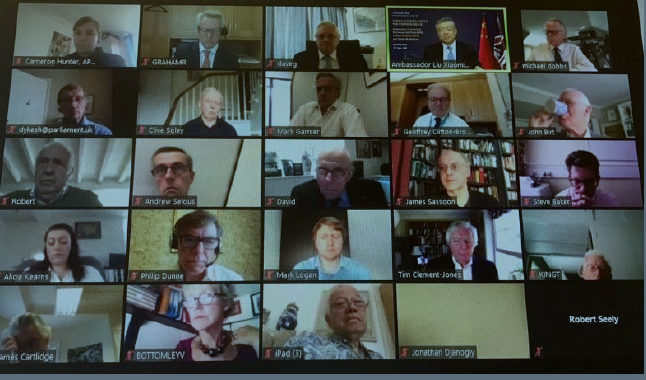
Saying No to Internal Vaccine Passports

https://bigbrotherwatch.org.uk/2021/04/70-mps-launch-cross-party-campaign-against-covid-passes/
70+ MPS LAUNCH CROSS-PARTY CAMPAIGN AGAINST COVID PASSE
BIG BROTHER WATCH TEAM / APRIL 2, 2021
Further to Sir Keir’s comments about vaccine passports being un-British and against the “British instinct”, over 70 MPs have launched a cross-party campaign opposing their “divisive and discriminatory use”.
MPs and peers from Labour, the Liberal Democrats and Conservative parties have signed a pledge to oppose the move.
Signatories include former Labour leader, Jeremy Corbyn, Labour MPs Dawn Butler and Rebecca Long Bailey, former director of Liberty, Baroness Shami Chakrabarti, and over 40 MPs from the Conservative Covid Recovery Group.
They have been supported by campaign groups Big Brother Watch, Liberty, the Joint Council for the Welfare of Immigrants (JCWI) and Privacy International.
The pledge states:
“We oppose the divisive and discriminatory use of COVID status certification to deny individuals access to general services, businesses or jobs.”
QUOTES
Baroness Chakrabarti said:
“International travel is a luxury but participating in your own community is a fundamental right. So internal Covid passports are an authoritarian step too far. We don’t defeat the virus with discrimination and oppression but with education, vaccination and mutual support.”
Leader of the Liberal Democrats, Ed Davey MP said:
“As we start to get this virus properly under control we should start getting our freedoms back, vaccine passports – essentially Covid ID cards – take us in the other direction.
“Liberal Democrats have always been the party for civil liberties, we were against ID cards when Blair tried to introduce them and we are against them now.
“I’m pleased Big Brother Watch is helping drive forward a growing consensus against Covid ID cards in our politics. Now I hope we can start to turn the tide on the creeping authoritarianism we are seeing from Number 10 across a broad range of issues.”
Sir Graham Brady MP said:
“Covid-Status Certification would be divisive and discriminatory. With high levels of vaccination protecting the vulnerable and making transmission less likely, we should aim to return to normal life, not to put permanent restrictions in place.”
Silkie Carlo, director of Big Brother Watch said:
“Our common goal is to emerge from lockdown – healthy, safe and free. But we won’t arrive at freedom through exclusion. Covid passes would be the first attempt at segregation in Britain for many decades, dividing communities without reducing the risks. We are in real danger of becoming a check-point society where anyone from bouncers to bosses could demand to see our papers. We cannot let this Government create a two-tier nation of division, discrimination and injustice.”
Minnie Rahman, Campaigns Director at JCWI, said:
“The Hostile Environment, which is built on identity checks, has already been proven to cause discrimination against migrants and people of colour. On top of this, migrant communities face significant barriers to accessing the vaccine. Any recovery plan which risks increasing racial discrimination and purposefully leaves people behind is doomed to fail.”
Sam Grant, Head of Policy and Campaigns at Liberty, said:
“We all want to get out of the pandemic as quickly as possible, but we need to do so in a way that ensures we don’t enter a ‘new normal’ which diminishes the rights and liberties we took for granted before the COVID crisis.
“Any passport system has the potential to create a two-tier society, and risk further marginalising people who are already discriminated against and cut off from vital services. Vaccine passports would allow ID systems by stealth, entrenching inequality and division.
“We need strategies that support and enable people to follow public health guidance, including vaccination, alongside more support for the most marginalised who have suffered the sharp edge of the Government’s focus on criminal justice over public health. We won’t get out of this pandemic by entrenching inequality, but only by protecting everyone.”
ENDS
Full list of signatories:
Labour Party
Diane Abbot MP
Bell Ribeiro-Addy MP
Tahir Ali MP
Rebecca Long Bailey MP
Clive Lewis MP
Beth Winter MP
Rachel Hopkins MP
Apsana Begum MP
Richard Burgon MP
Ian Byrne MP
Dawn Butler MP
Jeremy Corbyn MP
Mary Kelly Foy MP
Ian Lavery MP
Ian Mearns MP
John McDonnell MP
Grahame Morris MP
Kate Osborne MP
Zarah Sultana MP
Claudia Webbe MP
Mick Whitley MP
Nadia Whittome MP
Baroness Chakrabarti
Baroness Bryan of Partick
Lord Woodley
Lord Sikka
Lord Hendy
Liberal Democrats
Ed Davey MP
Layla Moran MP
Munira Wilson MP
Alistair Carmichael MP
Daisy Cooper MP
Wendy Chamberlain MP
Sarah Olney MP
Christine Jardine MP
Jamie Stone MP
Tim Farron MP
Lord Scriven
Lord Strasburger
Lord Tyler
Lord Clement-Jones
Conservative Party
Mark Harper MP
Steve Baker MP
Sir Iain Duncan Smith MP
Harriett Baldwin MP
Esther McVey MP
Adam Afriyie MP
Bob Blackman MP
Sir Graham Brady MP
Nus Ghani MP
Andrew Mitchell MP
Peter Bone MP
Ben Bradley MP
Andrew Bridgen MP
Paul Bristow MP
Philip Davies MP
Richard Drax MP
Jonathan Djanogly MP
Chris Green MP
Philip Hollobone MP
Adam Holloway MP
David Jones MP
Simon Jupp MP
Andrew Lewer MBE MP
Julian Lewis MP
Karl McCartney MP
Craig Mackinlay MP
Anthony Mangnall MP
Stephen McPartland MP
Anne Marie Morris MP
Sir John Redwood MP
Andrew Rosindell MP
Greg Smith MP
Henry Smith MP
Julian Sturdy MP
Sir Desmond Swayne MP
Sir Robert Syms MP
Craig Tracey MP
Jamie Wallis MP
David Warburton MP
William Wragg MP
Sir Charles Walker MP
NGOs/Businesses
Big Brother Watch
Liberty
Migrants Organise
Joint Council for the Welfare of Immigrants
medConfidential
Privacy International
Lord C-J Questions Touring Negotiation Failure
I questioned the Government on its total failure to negotiate a deal with the EU. It is clear the Home Office refused to grant EU citizens 90 day Permitted Paid Engagement. Touring musicians and creative artists have just been sacrificed on the altar of Tory immigration policy

My Lords, touring musicians and creative artists are deeply angry at this negotiating failure. Is not the root of the problem refusal by the Home Office to extend permitted paid engagement here to 90 days for EU artists, meaning as a result that work permits will now be required in many member states for our artists? Will the Government urgently rethink this and renegotiate on the instrument and equipment carnet and on trucking issues?
Online Harms: The Need for Early Legislation
This is what I said when (finally) the Government made its response to the White Paper Consultation in January
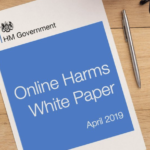
My Lords, over three years have elapsed and three Secretaries of State have come and gone since the Green Paper, in the face of a rising tide of online harms, not least during the Covid period, as Ofcom has charted. On these Benches, therefore, we welcome the set of concrete proposals we finally have to tackle online harms through a duty of care. We welcome the proposal for pre-legislative scrutiny, but I hope that there is a clear and early timetable for this to take place.
As regards the ambit of the duty of care, children are of course the first priority in prevention of harm, but it is clear that social media companies have failed to tackle the spread of fake news and misinformation on their platforms. I hope that the eventual definition in the secondary legislation includes a wide range of harmful content such as deep fakes, Holocaust denial and anti-Semitism, and misinformation such as anti-vax and QAnon conspiracy theories.
I am heartened too by the Government’s plans to consider criminalising the encouragement of self-harm. I welcome the commitment to keeping a balance with freedom of expression, but surely the below-the-line exemption proposed should depend on the news publisher being Leveson-compliant in how it is regulated. I think I welcome the way that the major impact of the duty of care will fall on big-tech platforms with the greatest reach, but we on these Benches will want to kick the tyres hard on the definition, threshold and duties of category 2 to make sure that this does not become a licence to propagate serious misinformation by some smaller platforms and networks.
I welcome the confirmation that Ofcom will be the regulator, but the key to success in preventing online harms will be whether Ofcom has teeth. Platforms Toggle showing location ofColumn 1711will need to demonstrate how they have reduced the “reasonably foreseeable” risk of harm occurring from the design of their services. In mitigating the risk of “legal but harmful content”, this comes down to the way in which platforms facilitate and even encourage the sharing of extreme or sensationalist content designed to cause harm. As many excellent bodies such as Reset, Avaaz and Carnegie UK have pointed out—as the noble Lord, Lord Stevenson, said, the latter is the begetter of the duty of care proposal—this means having the power of compulsory audit. Inspection of the algorithms that drive traffic on social media is crucial.
Will Ofcom be able to make a direction to amend a recommender algorithm, how a “like” function operates and how content is promoted? Will it be able to inspect the data by which the algorithm trains and operates? Will Ofcom be able to insist that platforms can establish the identity of a user and address the issue of fake accounts, or that paid content is labelled? Will it be able to require platforms to issue fact-checked corrections to scientifically inaccurate posts? Will Ofcom work hand in hand with the Internet Watch Foundation? International co-ordination will be vital.
Ofcom will also need to work closely with the CMA if the Government are to protect vulnerable victims of online scams, fraud, and fake and misleading online reviews, if they are explicitly excluded from this legislation. Ofcom will need to work with the ASA to regulate harmful online advertising, as well. It will also need to work with the Gambling Commission on the harms of online black-market gambling, as was highlighted yesterday by my noble friend Lord Foster.
How will this new duty of care mesh with compliance with the age-appropriate design code, regulated by the ICO? As the noble Lord, Lord Stevenson, has mentioned, the one major fudge in the response is on age verification. The proposals do not meet the objectives of the original Part 3 of the Digital Economy Act. We were promised action when the response arrived, but we have a much watered-down proposal. Pornography is increasingly available and accessible to young people on more sites than just those with user-generated content. How do the Government propose to tackle this ever more pressing problem? There are many other areas that we will want to examine in the pre-legislative process and when the Bill comes to this House.
As my honourable friend Jamie Stone pointed out in the Commons yesterday, a crucial component of minimising risk online is education. Schools need to educate children about how to use social media responsibly. What commitment do the Government have to online media education? When will the strategy appear and what resources will be devoted to it?
These are some of the yet unanswered questions before the draft legislation arrives, but I hope that the Government commit to a full debate early in the new year so that some of these issues can be unpacked at the same time as the pre-legislative scrutiny process starts.
Lord C-J : Give Musicians the Freedom to Tour
At a recent debate colleagues and I heavily criticized the Government’s failure to secure a cultural exemption from cabotage rules in the EU trade negotiation

My Lords, I join with other noble Lords in pointing out that the issues on cabotage are part of a huge cloud now hanging over the creative sector, including the requirement for work permits or visa exemptions in many EU countries, CITES certificates for musical instruments, ATA carnets for all instruments and equipment, and proof of origin requirements for merchandise. Cabotage provisions in the EU-UK Trade and Co-operation Agreement will mean that performers’ European tours will no longer be viable, because the agreement specifies that hauliers will be able to make only two journeys within a trip to the EU. Having to return to the UK between unloading sites in the EU will have a significant negative impact on the UK’s cultural exports and associated jobs.
A successful UK transport industry dedicated to our creative industries is at risk of relocation to the EU, endangering British jobs and jeopardising the attractiveness of the UK as a culture hub, as support industries will follow the companies that relocate to the EU. What proposals do the Government have for a negotiated solution, such as they have heard about today, that will meet their needs?


